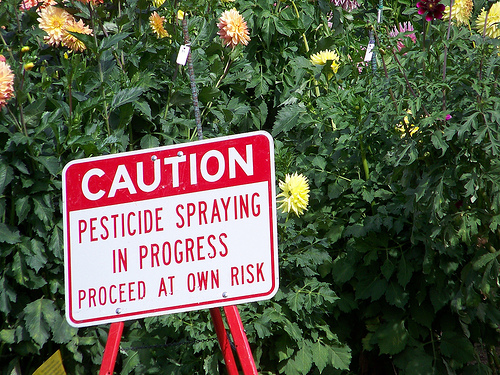State regulators ignored experts, catered to pesticide industry

California's former top pesticide regulator Mary-Ann Warmerdam, whose office was responsible for approving methyl iodide for agricultural use during the last days of the Schwarzenegger administration, ignored warnings by her own staff scientists that farm workers should not be exposed to more than trace amounts of the controversial fumigant. The suggested restrictions of the pesticide's use were “unacceptable, due to economic viability" concerns of the pesticide manufacturer. This according to documents obtained via a Public Records Act request by a coalition of farm worker and environmental groups suing the state.
The document cache also reveals that a number of scientists on the state-sanctioned independent panel which reviewed the safety risks of methyl iodide last year had lodged formal complaints against Warmerdam, calling her actions “not scientifically credible”. Warmerdam resigned in January. Gov. Jerry Brown has yet to appoint a successor to lead the department.
"(Warmerdam's) method was to consult with the pesticide manufacturer and determine what was acceptable to them, and then decide on what an acceptable level of exposure was," said Susan Kegley, a consulting scientist for the Pesticide Action Network, representing plaintiffs in the case.
The department has declined to comment on the documents because of pending litigation. "It is inappropriate to try this case in the media," said department spokeswoman Lea Brooks.
The documents show Warmerdam and her team of managers rejected Department of Pesticide Regulation (DPR) staff scientists' strict safety recommendations for a substance they had believed to be a developmental neurotoxin, because their restrictions on methyl iodide usage were deemed “excessive and difficult to enforce.” Part of the documents contain a memo written by staff scientist Jay Schreider to the state's top toxicologist, Gary Patterson. The note highlights the ideological split between researchers and management within the agency over the approval of methyl iodide.
“I am puzzled by the numbers,” Schreider wrote, adding that if "management's prerogative" is to approve methyl iodide then it's not right to call scientists' findings, which were the product of an apparent “mix and match approach,” the “credible basis for that decision.”
The pesticide was approved for agricultural use in December of 2010 mainly as a soil fumigant to treat strawberry fields throughout the state. In response, a coalition of farm worker and environmental groups sued the state to ban its use, pointing to evidence that methyl iodide could cause cancer and miscarriages in field laborers, and neurological disorders in children born to mothers who were exposed to the the chemical. Part of their lawsuit involved acquiring documentation of the DPR's approval process of methyl iodide in an attempt to make sense of why the department settled on exposure levels that are 120 times greater than what the agency's peer-review panel scientists believed to be safe.
At first, DPR officials refused to release any documentation, citing the “deliberative process” exemption. This allows state agencies to keep the rationale behind their administrative decisions a secret. Early last month, Alameda County Superior Court Judge Frank Roesch forced Warmerdam to hand over the documents. In his order, Roesch found that "the interest in public disclosure clearly outweighs agency interest in non-disclosure," and that the “great majority” of requested documents should never have been withheld in the first place. Plaintiffs made the documents available to the press in late August.
"DPR has an obligation to explain to the public the basis for its decision," said Greg Loarie, an attorney for Earthjustice, a group that represents the plaintiffs. "The public has every right to know that DPR approved methyl iodide over the objections of its own staff scientists."
Ted Slotkin, a pharmacology and cancer biology professor at Duke University who served on the peer-review panel, told California Watch that the documents prove that the DPR has no way of knowing whether or not methyl iodide is safe:
"DPR has no benchmark with which to establish the limits of exposures that could be deemed as 'safe' for pregnant women and children living in agricultural communities or attending schools adjacent to fields where methyl iodide will be applied," he said.
Methyl iodide is already in use by farmers throughout the state, but its first large-scale application will come this fall as next season's strawberry crops are planted.






